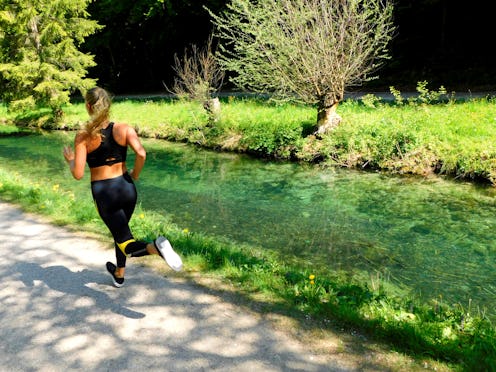Life
Experts Explain How To Stay Safe While You’re Outside

The joy of staying indoors can pale after a while, particularly if you're working from home, exercising at home, Zooming friends from home, and starting to find your own four walls really boring. But is it actually safe to go outside? Getting out of your pajamas and into the fresh air can absolutely be done while minimizing your risk of exposure to coronavirus.
"Going outside and enjoying fresh air is one of the best ways to take care of your physical and mental health during these uncertain times," Dr. Robert Quigley, M.D., senior vice president and regional medical director of medical emergency logistics service International SOS, tells Bustle. "However, doing so responsibly is imperative."
"Between working shifts at the hospital in NYC, I spent a small amount of time outside, and I was a bit surprised and taken aback to see parks full of people," Dr. Larry Burchett M.D., an emergency physician, tells Bustle. "This is one of the ways we could have a second wave of sickness from COVID-19."
Being responsible outside means picking your location carefully. "When outside, it is important to avoid crowds and stay six feet away unless you are with people who live in your household," Dr. Teresa Bartlett, M.D., medical director at Sedgwick, a claims management service, tells Bustle. "It is best to avoid crowded parks and walking paths where you may encounter large groups." If your local sunning spot always sees a lot of traffic, try for somewhere more remote. If your park feels pretty empty, wear a mask, sit on your designated blanket, and keep six feet away from everyone who isn't living with you. When in doubt, be more cautious than the rules.
If you're somewhere very isolated, you may be able to take off your mask, Dr. Burchett says. "A remote hike, a mountain top by yourself. Your backyard solo. You get it." If there are any other people around who aren't part of your household, though, you need to wear a mask, and remain six feet apart. Keep a mask on your person at all times regardless of where you're going.
Dr. Quigley says that you need to obey state, city and local government rules; if they've closed parks, beaches, and outdoor areas near you, don't sneak in to try and get some alone time. For one thing, if you twist your ankle or get lost, there won't be anybody around to help you. "Keep in mind that things can change quickly, so remember to keep up-to-date on these guidelines so you’re well informed," he says. Always check that your destination is open and accessible to the public before going outside.
Avoid traveling places that are outside your local area. "In order to stop the virus from spreading and to flatten the curve, we must do our best to avoid intermingling with other areas and people. This means staying within your local community," Dr. Quigley says. You may be asymptomatic, and carrying the virus to another community, even if you don't think you'll interact with anybody else, could be dangerous.
Going outside with other people within your isolation bubble is nice for exercise, but keep your distance. "Avoid playing games that require you to touch the same objects that someone else touched, like tennis, football, baseball, volleyball, or pickleball," Dr. Bartlett says. Doing strenuous exercise, including jogging, means you should keep more than six feet away from others, Dr. Quigley says, because heavy breathing could spread respiratory droplets even further.
Now is not the time to start free-climbing or trying other dangerous outdoor activities for fun. "Hospitals and other healthcare facilities are already overwhelmed and we need to make an effort to avoid emergency visits at all costs," Dr. Quigley says. Safety outdoors means paying attention to your hygiene when you get home, too. Washing your hands for at least 20 seconds after all outdoor activities is essential, as is bringing hand sanitizer with at least 60% alcohol, Dr. Quigley says. When you get back to your house, "Leave your shoes outdoors, wash your clothes, and disinfect any part of your body that might have been in contact with infected droplets, such as your face, hands, or neck," he says.
Being outside in nature right now can help lower your stress levels and help you expend built-up energy, Dr. Bartlett says, but we all need to stay safe. "If you’re going to be outside around other people where social distancing is difficult, remember to wear a mask or keep one on hand in case it’s needed," she says. And wash those hands like a demon.
Experts:
Dr. Teresa Bartlett M.D.
Dr. Larry Burchett M.D.
Dr. Robert Quigley M.D.